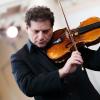On dreams and chaos

A shared friendship on the stage and a common dream: Roman Spitzer, principal viola, and principal cello Emanuele Silvestri are on a mission to make and share music. Through Richard Strauss' symphonic poem Don Quixote, they take up the challenge.
‘I feel like I can relate to Sancho Panza: he enjoys a good sleep, good food, and knows how to savor life,’ laughs Roman Spitzer, principal viola in the Rotterdam Philharmonic Orchestra. He and his colleague Emanuele Silvestri, solo cellist, climb into the skin of the two protagonists in Richard Strauss’ Don Quixote; an exceptionally colorful symphonic poem.
Don Quixote dreams that he is a knight. In his fantasy, inns turn into castles, windmills he takes for giants, and a flock of sheep for an entire army. The book The Ingenious Gentleman Don Quixote of La Mancha by Miguel de Cervantes has inspired many creative minds, among them Strauss. His famous orchestra piece, composed in Munich in 1897, lasts about 45 minutes. The theme and its variations challenge an entire orchestra to express as imaginatively as possible the many moods of life.
Savouring life and chaos
A Sunday at De Doelen, just before the afternoon concert of the Rotterdam Philharmonic Orchestra. Spitzer and Silvestri, already dressed in their suits, recount their upcoming adventure with Strauss. ‘No kidding,’ says Spitzer, ‘it’s wonderful to see how basic the character Sancho Panza really is: a chaotic man who wants to enjoy life, and avoids all the difficult questions that stand in the way of his enjoyment. Along the way he learns from his master, Don Quixote, with whom he travels around. But despite that, he eventually keeps both feet on the ground. And Strauss has written it all down wonderfully. Ravingly difficult, for the viola as well as the cello, but he knew exactly how to write for these instruments.
You don’t always have to agree, but when you know someone, you understand the direction they want to go.

‘With every measure the music changes color, the characters are very complex.’ Silvestri: ‘In Don Quixote, the character I portray on my cello, I recognize an important thought that I love. I don’t see myself as a master or a boss, but I love that Don Quixote is a dreamer. He’s also a spiritual thinker. There is a childlike quality to how he sees the world and tries to take others along with him in that vision. It is a way of surviving, among the difficulties of existence. If you have a plan and you’re trying to reach it, you have to dare to dream, even if it’s not realistic.’
Not long after Spitzer and Silvestri first met, a friendship between the two musicians developed, soon accompanied by the shared wish to perform Strauss’ Don Quixote. Spitzer and Silverstri know each other from Israel, where they both played in the Israel Philharmonic Orchestra. Spitzer was the first to leave for the Netherlands, in 2017. He persuaded Silvestri to follow him: ‘come join me!’ The Rotterdam had been looking for a solo cellist for some time, and so one thing led to another. The friendship, not just as musicians, became closer.
‘A great coming together,’ Silvestri calls the production of Strauss’ opus. The chief conductor of the Rotterdam, Lahav Shani, too, is an old acquaintance of the two musicians from Israel. They played chamber music together and performed concerts under his direction. Lahav Shani is currently music director of the Israel Philharmonic.
Essence and challenge
Silvestri: ‘When you play with befriended musicians, there is a natural connection on stage. For me, playing with friends definitely adds something. The energy flows effortlessly, and, for me, that is the essence of playing chamber music. In an orchestra, too, we try to use the chamber music approach: to understand each other intimately on a musical level and get as close to each other as possible. When Roman plays, he is in touch with the music, and completely devoted. On the stage, his sole purpose is to make music.’ Addressing his colleague: ‘What I also always like to see is that you try to make everything easy, create a good atmosphere, so we can work together in a relaxed way.’ Spitzer: ‘Thank you! I think we both work this way: it’s not the ego that counts, it’s the music. We actually hardly ever talk about the music, or at least when it comes to how you want to play something. You feel each other. In the moment of playing, you exchange musical ideas. You don’t always have to agree, but when you know someone, you understand the direction they want to go.’ Music is the expression of emotion, Spitzer has clear thoughts about that: ‘Written music is two-dimensional, the notes are written on a piece of paper. A musician turns it into a multidimensional world. Color, texture, harmony, and rhythm, all follow from those little dots and dashes on the page. A challenge for me, decoding a score. A boundless world emerges.’
The adventure with Strauss
Silvestri: ‘Speaking of challenges: Strauss’ music certainly is one. These are scores that are requested for orchestra auditions. You have to have your act together technically, be in perfect control of your instrument, but that’s only the first step. Don Quixote’s score calls you to delve deep in order to bring to life all possible feelings and expressions. Strauss is a master at painting with a vast color palette, he masters lyricism and storytelling like no other. Connecting to the soul of the character you are portraying is the most difficult of all.’
Playing with friends definitely adds something. The energy flows effortlessly

Spitzer: ‘For me, it works this way: when I walk backstage from the dressing room to the stage, the adrenaline flows. Simultaneously, I forget everything I’ve studied and feel completely empty. Somewhere inside me sits the idea of the piece I am about to play, but only subconsciously. I feel free to start drawing the character, as if it were completely new to me. At moments like these, just a little, you become the composer of the piece.’
Silvestri: ‘And when that happens, it’s nice to play with people you know well. You don’t run into any surprises because you know each other’s musical language. You can concentrate on the heart of the matter: getting the music across the right way.’ The latter has grown over the years, Silvestri philosophizes. ‘When I was young, I primarily wanted to show myself, I was thinking of success, and the applause. That’s totally different now. Of course it’s wonderful to give a good concert that is received enthusiastically, but for me, now, making music is more about sharing. Sharing with colleagues, students, the audience. Passing on my knowledge and experience is important to me.’
Making music as a mission
In addition to their orchestra jobs, Emanuele SIlvestri and Roman Spitzer both teach: Silvestri at the Conservatory of Amsterdam, Spitzer in Rotterdam. ‘I used to like being in the spotlight, the attention on me, people listening to me,’ says Spitzer. ‘And even now, I feel like an actor. And yet, the attention has become less important to me. Making music is a craft, of course, but I see making music as my mission. Art is a mission. Sharing music is a necessity. Being yourself in the process, that’s a large task. If you really want to convey something, you have to be yourself, and not do anything special. That’s a profound truth.’ Silvestri: ‘And that brings us back to Don Quixote. This knight believes in his dreams. If you believe in your mission, you can get the message across. As a musician, you hope you can kiss the listener awake, and together experience the beauty of the music.’
Text: Frederike Berntsen photo: Shody Careman
This article appeared on Intrada, edition 2024-25 no. 2.
